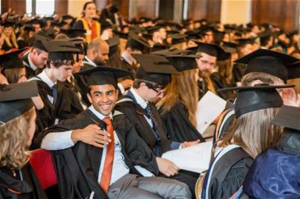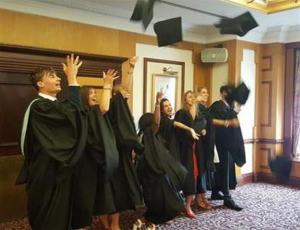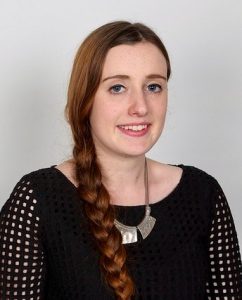On 10 July, I attended the graduation ceremony and reception for the Hull York Medical School (HYMS) Class of 2017, in order to watch my friends achieve their dreams, and try to put the events of the day into words. Having started my journey at the school as part of the same cohort, it was amazing to watch graduation become a tangible, real event, rather than the distant dream it seemed on our first day here.
 You could feel the real mix of emotions throughout the day: happiness and relief at successfully completing the course (something that everyone at some point doubted would actually happen); sadness at leaving university life and the close friendships formed here behind; and apprehension at being plummeted into life as a junior doctor – considered a baptism of fire, given the strain the NHS is currently experiencing. For parents and loved ones, however, one emotion was ubiquitous, and that was pride. They have seen first-hand the years of hard work put in by each graduate, for the sake of pursuing the career we dreamed of: aiming to help people at their most vulnerable.
You could feel the real mix of emotions throughout the day: happiness and relief at successfully completing the course (something that everyone at some point doubted would actually happen); sadness at leaving university life and the close friendships formed here behind; and apprehension at being plummeted into life as a junior doctor – considered a baptism of fire, given the strain the NHS is currently experiencing. For parents and loved ones, however, one emotion was ubiquitous, and that was pride. They have seen first-hand the years of hard work put in by each graduate, for the sake of pursuing the career we dreamed of: aiming to help people at their most vulnerable.
To ensure all students graduate together, HYMS alternates the site of graduation each year between the Universities of Hull and York. There are preferences among students based on many things – their home university, the gown design (grey at York, which often divides opinion!), and even the best places to get graduation photographs – but this year was special. As Hull had been awarded the prestigious title of City of Culture 2017, medical students were invited to vote on whether to have graduation at York, as it was scheduled to be, or Hull. Voter turnout was very high, with students ultimately deciding that they would prefer to graduate in Hull.
The weather was glorious, which was fortunate as it made for beautiful photos and meant the walk between the Royal Station Hotel (which hosted the pre-graduation reception) and City Hall (location of the ceremony itself) was very pleasant. The graduation was a quintessentially British affair, with lecturers and professors in their colourful academic gowns parading down the aisle led by the ceremonial graduation mace. A particular idiosyncrasy of University of Hull graduation ceremony is that the announcements are made by their local, award-winning, town crier: an enthusiastic and humorous show
The Chancellor of the University of Hull, former Secretary of State for the Department of Health The Right Honourable Virginia Bottomley, spoke very aptly about her role in dealing with complex medicolegal ethical dilemmas and how we as the next generation will always have a duty to act in these situations, as per our oath.
The oath medical students take upon graduation day is a modified, modernised version of the famous Hippocratic Oath and is voluntary (as its contents are now enshrined in law for the most part), though with few abstentions. The line that struck me the most was: “my colleagues will be my brothers and sisters”. This is not how I had initially thought of my medical school friends, but is, I feel, an accurate description.
 From arriving five or six years ago to this day, the bond medical students have with one another is undeniably a strong one. From a young age we have the privilege of seeing people in the most intimate times of their lives: the births of their children; upon diagnosis of a life-changing or terminal illness; and their final moments on this planet. People confide in us things they may not even have told their parents or spouses. We experience the highs and lows of others’ lives – as well as our own – and really rely on the support of one another. We have had so many amazing experiences together as students, but we are also mindful that we are held to a higher standard in all aspects of our lives. Likewise, our terms start earlier and finish later than those of our non-medical friends, and we are set to work from day one of Freshers’ Week. With our course being (at least) five years and travelling across many sites, we have often lived for years alongside our medical peers. This is why many friendships will last a lifetime – and why many medics marry one another. Even with the vast range of personalities here, the natural empathy of being a healthcare professional means common ground is quickly found, enhanced by a deep sense of pride in our NHS; even in tough times, with staff facing more and more demands, there is a real determination among healthcare workers to put in the extra hours and complete the additional tasks – because we believe in the NHS, and we want it to work for everyone.
From arriving five or six years ago to this day, the bond medical students have with one another is undeniably a strong one. From a young age we have the privilege of seeing people in the most intimate times of their lives: the births of their children; upon diagnosis of a life-changing or terminal illness; and their final moments on this planet. People confide in us things they may not even have told their parents or spouses. We experience the highs and lows of others’ lives – as well as our own – and really rely on the support of one another. We have had so many amazing experiences together as students, but we are also mindful that we are held to a higher standard in all aspects of our lives. Likewise, our terms start earlier and finish later than those of our non-medical friends, and we are set to work from day one of Freshers’ Week. With our course being (at least) five years and travelling across many sites, we have often lived for years alongside our medical peers. This is why many friendships will last a lifetime – and why many medics marry one another. Even with the vast range of personalities here, the natural empathy of being a healthcare professional means common ground is quickly found, enhanced by a deep sense of pride in our NHS; even in tough times, with staff facing more and more demands, there is a real determination among healthcare workers to put in the extra hours and complete the additional tasks – because we believe in the NHS, and we want it to work for everyone.
As I saw everyone collect their degrees that day and walk across the stage, I knew: my colleagues are my brothers and sisters. And as they leave university, as qualified doctors, and spread their wings across the UK, I wish them well.
 Katherine Harris is a final year medical student at HYMS and also intercalated in Psychological Medicine at the University of Birmingham. She is interested in medical education, widening participation and paediatrics and is also our BMA representative.
Katherine Harris is a final year medical student at HYMS and also intercalated in Psychological Medicine at the University of Birmingham. She is interested in medical education, widening participation and paediatrics and is also our BMA representative.

